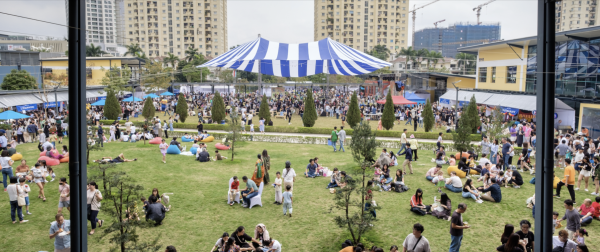UNISMUN VIII – Our Virtual World
Last week marked the completion of UNIS’ annual Model United Nations conference, with this year’s theme being ‘Our Virtual World’. Delegates from 15 schools across the South East Asian region came together at UNIS and caused rampant chaos, wandered around in fancy clothing during break time, hogged our rooms during school time and crowded our cafeteria during lunch time. But what went on behind the closed doors, only our esteemed MUN participants know.
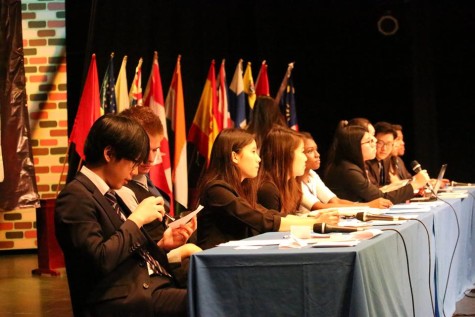
MUN, for the uninitiated, is a simulation of the United Nations’ debate sessions. Delegates are separated into committees, each dealing with a current world issue, and each person represents a country, acting for their countries’ interests after careful individual research (I represented North Korea – to the jealousy of many). Then, there are our chairs, and our Secretary General and President of the General Assembly, Seyon Park and YJ Lee. Last, but certainly not least, are the admins – helpers and note-passers for the admittedly lazy delegates, whose job seems to be making dramatic speeches, arguing pointlessly over nuances, and passing tic-tac-toe games on official note paper.
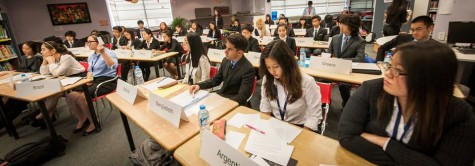
The first day of UNISMUN began with an address by the Secretary General and the President of the General Assembly, as well as Mr. Michael Joseph Stolarczyk, here in Hanoi as part of Microsoft’s Global Logistics Team, speaking on the theme of “Our Virtual World” – before we headed off to our respective conference rooms.
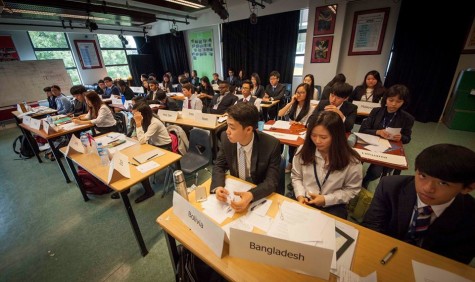
Over the next few days, the 6 committees discussed topics ranging from the Syrian Arab Republic’s humanitarian situation, to the issue of child soldiers, and into various topics concerning the virtual world, such as artificial intelligence and cyber terrorism. We made speeches, and argued, and raised questions – whether supporting or against the speaker. The delegates adhered to the rules of parliamentary language, and followed procedures based on the United Nations’ procedures. And though the whole process is intimidating and strange at first, we learned much and improved in our public speaking and debating skills over three short days.
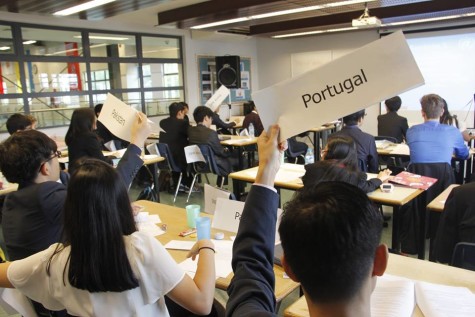
However, not everything is bureaucratic and formal in MUN – after all, we can only go so far until us delegates revert to regular teenagers. The conference rooms were constantly bursting with laughter, filled with absurd analogies (baguettes and donuts, anyone?) and glancing remarks which has no place in an actual UN debate (I being at the butt end of many remarks about nuclear weaponry). After the second day, we participated in an organized social night – consisting of a pizza party (so many pizza boxes), a scavenger hunt across the school (totally fair for the UNIS delegates), and a dance (featuring top notch performances by the delegate of Chad).
Ending the conference is, as always, the plenary session, when all delegates sit down for three hours in the auditorium to discuss passed resolutions. If we thought that the presence of the Secretary General and the President of the General Assembly would bring order and professionalism to the rest of us, we were wrong. If anything, the plenary session was even more of a riot compared to our individual committees – objections shouted left and right, admins running across the room delivering side conversations, delegates acting over-the-top on stage while bashing down resolutions – and in the end, of the five resolutions discussed, only one was passed, after a provocation by the delegate of Chad that claimed we were all useless and bureaucratic, much like the real United Nations.
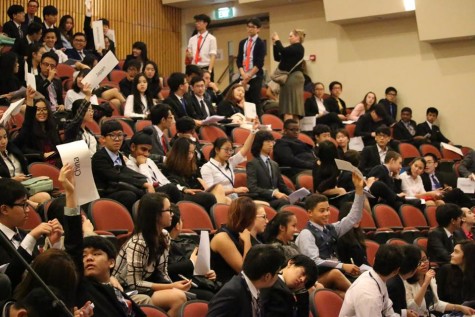
His speech was quite an important memory of my experience at UNISMUN VIII. While he did say that the UN was useless and ran by bureaucratic, unsympathetic leaders , and urged us to stop arguing and agree just for the sake of agreeing, before being shouted off the stage by every single delegate in the house, he raised fair points. We, just like the real United Nations, often argue endlessly and arrive to the conclusion of inconclusiveness. Sure, the resolutions might have not benefited everyone, and definitely weren’t detailed enough, but perhaps it is up to the individual countries to figure out the details, and achieve the goals with the best fit for their individual circumstances. In the end, this is the true goal of MUN – to arrive at conclusions, and make the decisions that the United Nations did not; to find the problem with the current system, and to overcome it in our own way; and to create a new, inspired generation of delegates and chairs that might perhaps, one day, join the United Nations, with an open mind.
And so, another UNISMUN comes to an end, and we say goodbye to our guests. To the folks that didn’t join MUN – come join us, and join a world of exhilarating debate and problem solving. To the delegates and chairs of UNISMUN VIII – I hope to see your faces again next year. And to the seniors in MUN – get out there soon and make a difference!
For more photos of the event, visit the UNISMUN Facebook page.


